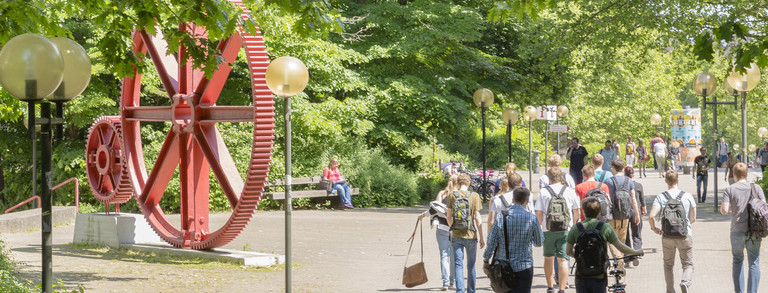
Research Area Industry and Production
The Lamarr Institute is a leading research center for machine learning (ML) and artificial intelligence (AI) in Germany. Following a successful evaluation by an international committee of experts, the Lamarr Institute emerged from the Competence Center Machine Learning Rhine-Ruhr (ML2R), which was previously funded as a temporary project, and aims to develop high-performance, trustworthy and resource-efficient AI applications. Named after the inventor Hedy Lamarr, the institute advocates the technological and ethical standards of AI. The Lamarr Institute works in collaboration with TU Dortmund University, the University of Bonn and the Fraunhofer Institutes for Intelligent Analysis and Information Systems (IAIS) and for Material Flow and Logistics (IML). The institute focuses on the concept of “Triangular AI”, which integrates data, knowledge and contextual information to develop robust AI systems.
Research at the Lamarr Institute is divided into different areas. The VM working group is strongly connected to the Industry and Production research area of the Lamarr Institute, which deals with the research and integration of ML and AI in production technology. In addition to the production of components in the specified quality as an objective, the focus in the production technology environment is on various resources that need to be minimized. These include, for example, the reduction of machine times and costs for tools, workpieces and energy used. Traditionally, technological investigations or simulation-based approaches are often pursued in order to optimize process design and operation in a resource-oriented manner.
ML represents a rapidly evolving field that is transforming the way complex systems are analyzed and understood by automating the detection of significant patterns and relationships from large data sets. Therefore, incorporating ML into manufacturing engineering can significantly improve the competitiveness and sustainability of production processes. Specifically, by integrating ML methods, it is possible to achieve predictions with a high degree of generalization that could not be achieved through technological or simulative approaches.
Within the Industry and Production research area, the focus is therefore particularly on the combination of process data, simulations and ML methods in the context of hybrid learning using the example of different production processes in order to minimize the experimental effort required to analyse and model process characteristics. In addition to simulations, generative modeling methods are also being investigated in order to augment the data sets with additional synthetic data. This is particularly advantageous in order to reduce the manual annotation effort required to create the labels, which is necessary to be able to perform supervised learning.
The research area is based on triangulated AI as the overarching strategic direction of research at the Lamarr Institute by combining data-based observations with knowledge from physical and expert-based domain knowledge in a specific production engineering context, such as wear prediction for machines or tools. This also addresses tangential challenges, such as concept drift, which result from changing process conditions and data.
The scientific investigations in the Industry and Production research area are intended to make a significant contribution to a vision in which process characteristics and states in the production technology landscape are automatically analyzed in order to derive process-related optimization recommendations and continuously improve learned models with new data obtained during operation.





